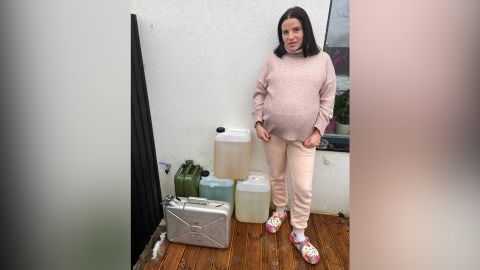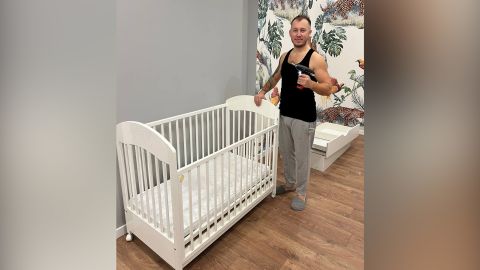CNN
–
Katerina and her husband Oleg assume what every Kievan should – Power outage for a long timeHours without any internet connection and the constant apprehension of Next barrage.
But with the onset of 2023, they are also preparing for the arrival of twins. Katrina, who is 34 years old, is eight months pregnant. CNN agreed to use only her and Oleg’s first names because they feared for their privacy.
She doesn’t get much rest before the big day. Sirens go off almost every day, and the roar of explosions is all too familiar. Their lives are shaped by scheduled blackouts, as electricity is shared between regions to mitigate their impact Russia strikes in Ukraine Energy infrastructure.
“On New Year’s Eve, I tried to take a nap,” she told CNN from her home on the outskirts of Kyiv. But I woke up to the sound of explosions and it lasted all night. Sirens were playing all night until 4:30 in the morning.”
It is difficult for residents to distinguish between the sound of air defenses in operation and the impact of cruise missiles and Russian drones.
“I don’t mind the power being out,” Katrina said, “but we’re worried about the next wave of Russian missiles. Will it be us? It’s like a gamble going.”
A nearby neighborhood – Vyshhorod – was hit a month ago, and random The nature of the strikes means that residential areas are at risk as are power plants and railway lines. Dozens of health facilities throughout Ukraine, incl Obstetrics and children’s hospitals, which have been bombed since the beginning of the conflict.
When the sirens don’t go off, Katrina said, there’s another new noise in her neighborhood: the chatter of generators as homes and businesses try to compensate for being without power for up to 12 hours a day.
“It’s the bells for Christmas this year,” she said.
Despite the dangers and the twins’ imminent arrival, Katerina still travels to central Kyiv twice a week to use one of the co-working spaces that have popped up all over the Ukrainian capital.
These spaces have become completely professional, with furniture, heating, lighting, and reliable internet, provided through Starlink terminals, which were purchased from the company owned by Elon Musk.
Katerina works in the field of logistics, helping to import large containers into Ukraine. It is more than just a livelihood. It’s also a way to contribute to the war effort.

Katerina and Oleg are more fortunate than most Ukrainians in that they have a small generator at home, but they use it sparingly. There’s always the risk of running out of diesel to run it – it uses a liter of fuel every hour and needs cooling every four hours. They said they had to choose which appliances would be turned on: it was the lights or the laundry.
They fully expect that they will need it long after the twins are born.
Living in Kyiv during Russia’s war on Ukraine means getting ready. Kateryna and Oleg have lockers full of batteries, power banks, and light bulbs. If Russia’s missile campaign against Ukrainian infrastructure continues, as most people expect, scheduled blackouts could become less predictable, with more emergency outages.
There is enough food in the shops, “but sometimes I have to shop with a flashlight,” says Katrina. They keep about a two-month supply of food in the house, just in case the situation goes from bad to worse.

Like many people from Kyiv, Katerina and Oleg moved away from the capital to a safer part of western Ukraine when the invasion began last February. But they never wanted to leave the country. Soon, they felt that the equalization of strength made them return to the city.
“I have a job here; Oleg has a job here and he can’t work remotely. We have many friends here, our home. For me it’s a nightmare to move to another place,” Katerina said.
Katerina feels they are involved in the effort to secure Ukraine’s future. She said that in the first months of her pregnancy, she helped Ukrainian volunteer organizations collect donations for warm clothes and equipment for the Ukrainian army.
The company my husband works for has a fund and they help Ukrainian fighters on the front lines with equipment like drones and pickup trucks. “We helped raise money for such equipment,” she said.


Like many other Ukrainians, they helped a family who had escaped from the front lines earlier in the war. The mother had given birth in the midst of Russian bombing of their hometown of Kremina in the eastern Luhansk region. When the family settled in a suburb of Kyiv, Oleg and Katerina helped them out with warm clothes and food.
Katerina says she is not afraid of becoming a mother in wartime. She and Oleg want their sons to grow up in an environment that would be the exact opposite of what life would be like under Russian occupation.
“I really want my children to live in a free Ukraine, I want them to be safe. They have the right to be safe and protected like all other children in the world. I don’t want them to live in fear of death by a Russian missile, they should be happy and comfortable.”
Her only concern – other than delivering healthy babies – is that she might find herself lying in the hospital in the midst of another wave of missile attacks. She said she would pray hard at this point.

. “Proud zombie lover. Evil pop culture buff. Amateur thinker. Total food practitioner. Tv evangelist.”
